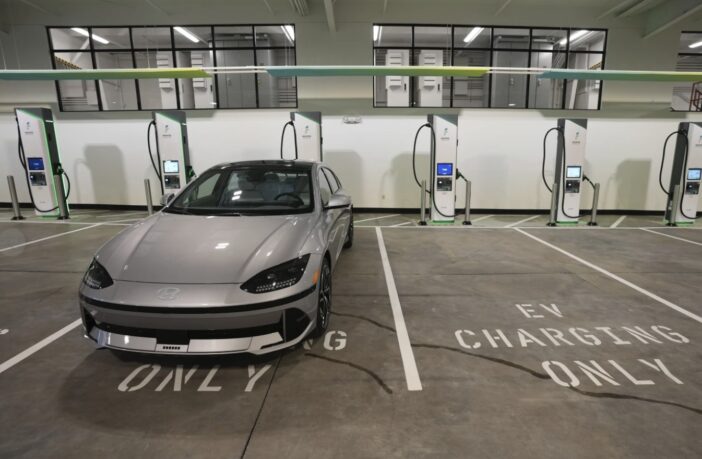Electric vehicles are changing the face of transportation, giving way to conversations about the use of green energy in a contentious political environment. (Photo credit: AP News)
States across the country are paving the way for electric vehicles (EVs). This green topic is also harshly divided along red and blue lines—which is to say, it’s heavily politicized. In North Carolina and Virginia, for instance, Republican leaders have rolled back or stunted EV initiatives adopted by Democrats.
Donald Trump, who will be inaugurated as president on Jan. 20, 2025, has criticized EVs and federal EV policies under President Joe Biden. Trump later backtracked and said he’s “for electric cars” for a segment of the population after receiving an endorsement from Tesla CEO Elon Musk. But if elected, Trump still intends to undo Biden-era EV incentives.
To cover current EV incentives and get a sense of the impact that rollback could have, Truck Parking Club compiled information from the Department of Energy to illustrate EV regulations and support in Washington D.C. as part of a broader national analysis.
This analysis only includes public incentives and policies and does not include efforts by private entities or utility providers. It lists major incentives and laws listed on the DOE website as of Oct. 1, which in many cases incentivize other alternative fuels like biodiesel and ethanol in addition to EVs. This list is intended to be comprehensive but not necessarily all-encompassing.
Washington D.C. EV policies
These are the incentives, goals, policies, and privileges offered for EVs and other alternative-fuel vehicles in Washington D.C.
Government goals, policies and requirements:
– Aims to achieve 25 percent zero-emission vehicle registrations by 2030
– Starting in 2026, requires government entities to only acquire zero-emission vehicles, unless there are no equivalent models available
– Requires 70 percent of certain new fleet purchases to be clean fuel vehicles
– Executive office of the mayor to establish a transportation electrification program, which will require all buses, large private fleets, commercial motor carriers, limo services, and taxis to be zero-emission vehicles by 2045
– Requires transportation network companies to complete emissions reduction plans, including increasing zero-emission vehicles among drivers
Monetary incentives:
– Offers income tax credit for equipment and labor costs to convert vehicles to alternative fuel, or to purchase and install alternative fuel infrastructure (for businesses and individuals)
– Exempts some EVs from excise tax on certificate of title, including original and subsequent purchasers
Privileges, protections and exemptions:
– Exempts certified clean fuel vehicles from time-of-day and day-of-week restrictions and commercial vehicle bans, if part of a fleet of at least 10 vehicles in D.C.
– Allows EV owners to utilize curbside charging if they don’t have designated off-street parking
External collaborations:
– The Mid-Atlantic Electrification Partnership, which supports the deployment of EVs and EV chargers throughout the region
– Multi-State Zero-Emission Vehicle Task Force
Other:
– Department of Transportation required to install at least 15 public EV charging stations throughout the district and collect data on their use
This story originally appeared on Truck Parking Club and was produced and distributed in partnership with Stacker Studio.



